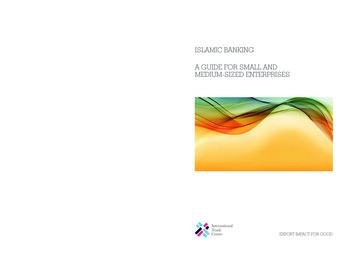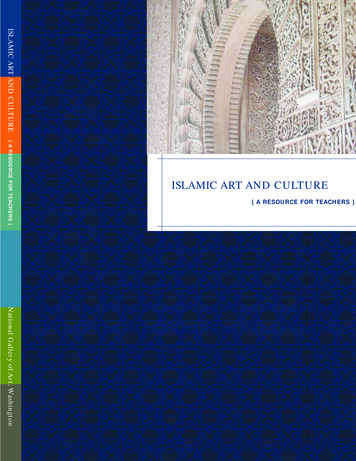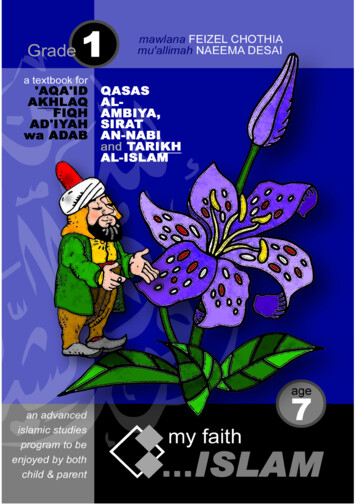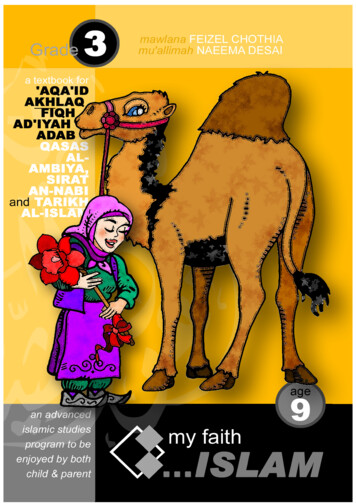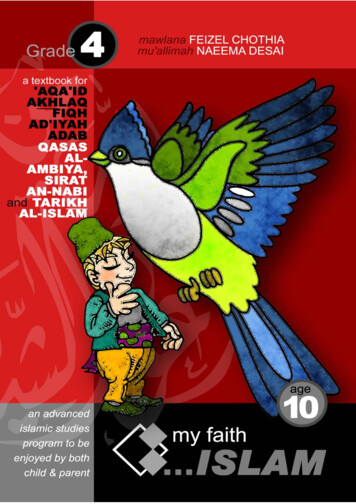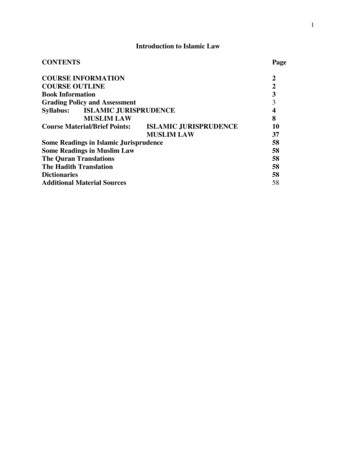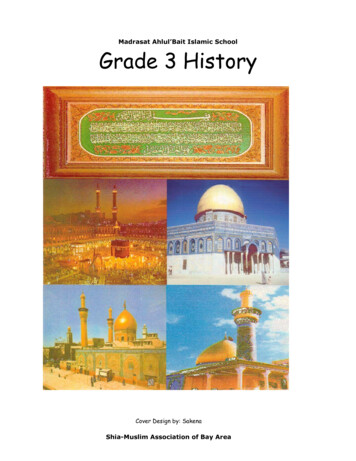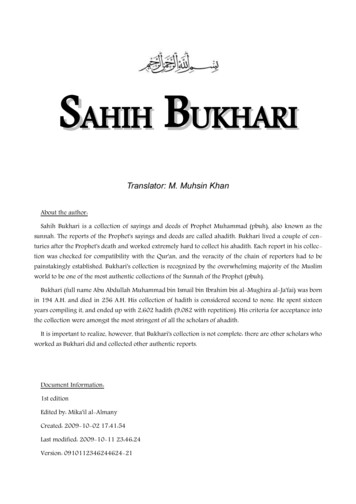
Transcription
SAHIH BUKHARITranslator: M. Muhsin KhanAbout the author:Sahih Bukhari is a collection of sayings and deeds of Prophet Muhammad (pbuh), also known as thesunnah. The reports of the Prophet's sayings and deeds are called ahadith. Bukhari lived a couple of centuries after the Prophet's death and worked extremely hard to collect his ahadith. Each report in his collection was checked for compatibility with the Qur'an, and the veracity of the chain of reporters had to bepainstakingly established. Bukhari's collection is recognized by the overwhelming majority of the Muslimworld to be one of the most authentic collections of the Sunnah of the Prophet (pbuh).Bukhari (full name Abu Abdullah Muhammad bin Ismail bin Ibrahim bin al-Mughira al-Ja'fai) was bornin 194 A.H. and died in 256 A.H. His collection of hadith is considered second to none. He spent sixteenyears compiling it, and ended up with 2,602 hadith (9,082 with repetition). His criteria for acceptance intothe collection were amongst the most stringent of all the scholars of ahadith.It is important to realize, however, that Bukhari's collection is not complete: there are other scholars whoworked as Bukhari did and collected other authentic reports.Document Information:1st editionEdited by: Mika'il al-AlmanyCreated: 2009-10-02 17:41:54Last modified: 2009-10-11 23:46:24Version: 0910112346244624-21
SAHIH BUKHARI - 2 / 1700
SAHIH BUKHARI ContentVolume 1.6Book 1: Revelation .7Book 2: Belief .13Book 3: Knowledge .26Book 4: Ablutions (Wudu') .48Book 5: Bathing (Ghusl) .72Book 6: Menstrual Periods .81Book 7: Rubbing hands and feet with dust (Tayammum) .89Book 8: Prayers (Salat) .94Book 9: Virtues of the Prayer Hall (Sutra of the Musalla) .124Book 10: Times of the Prayers .130Book 11: Call to Prayers (Adhaan).148Book 12: Characteristics of Prayer .175Volume 2.205Book 13: Friday Prayer .206Book 14: Fear Prayer .219Book 15: The Two Festivals (Eids) .221Book 16: Witr Prayer .231Book 17: Invoking Allah for Rain (Istisqaa).234Book 18: Eclipses.242Book 19: Prostration During Recital of Qur'an .249Book 20: Shortening the Prayers (At-Taqseer) .252Book 21: Prayer at Night (Tahajjud) .259Book 22: Actions while Praying .275Book 23: Funerals (Al-Janaa'iz) .286Book 24: Obligatory Charity Tax (Zakat) .323Book 25: Obligatory Charity Tax After Ramadaan (Zakat ul Fitr) .346Book 26: Pilgrimmage (Hajj) .349Volume 3.402Book 27: Minor Pilgrammage (Umra) .403Book 28: Pilgrims Prevented from Completing the Pilgrimmage .412Book 29: Penalty of Hunting while on Pilgrimmage .416Book 30: Virtues of Madinah .426Book 31: Fasting .432- 3 / 1700
SAHIH BUKHARI Book 32: Praying at Night in Ramadaan (Taraweeh) .456Book 33: Retiring to a Mosque for Remembrance of Allah (I'tikaf) .460Book 34: Sales and Trade .465Book 35: Sales in which a Price is paid for Goods to be Delivered Later (As-Salam) .503Book 36: Hiring .507Book 37: Transferance of a Debt from One Person to Another (Al-Hawaala) .514Book 38: Representation, Authorization, Business by Proxy .519Book 39: Agriculture .525Book 40: Distribution of Water .533Book 41: Loans, Payment of Loans, Freezing of Property, Bankruptcy .541Book 42: Lost Things Picked up by Someone (Luqaata) .551Book 43: Oppressions .555Book 44: Partnership .566Book 45: Mortgaging .572Book 46: Manumission of Slaves .574Book 47: Gifts .585Book 48: Witnesses .600Book 49: Peacemaking .615Book 50: Conditions .621Volume 4.632Book 51: Wills and Testaments (Wasaayaa) .633Book 52: Fighting for the Cause of Allah (Jihaad) .643Book 53: One-fifth of Booty to the Cause of Allah (Khumus) .713Book 54: Beginning of Creation .742Book 55: Prophets .770Book 56: Virtues and Merits of the Prophet (pbuh) and his Companions .804Volume 5.851Book 57: Companions of the Prophet .852Book 58: Merits of the Helpers in Madinah (Ansaar) .884Book 59: Military Expeditions led by the Prophet (pbuh) (Al-Maghaazi) .932Volume 6.968Book 60: Prophetic Commentary on the Qur'an (Tafseer of the Prophet (pbuh)) .969Book 61: Virtues of the Qur'an .1111Volume 7.1131Book 62: Wedlock, Marriage (Nikaah) .1132Book 63: Divorce .1177- 4 / 1700
SAHIH BUKHARI Book 64: Supporting the Family .1199Book 65: Food, Meals .1205Book 66: Sacrifice on Occasion of Birth ( Aqiqa) .1225Book 67: Hunting, Slaughtering .1227Book 68: Al-Adha Festival Sacrifice (Adaahi) .1242Book 69: Drinks .1249Book 70: Patients .1262Book 71: Medicine .1271Book 72: Dress .1292Volume 8.1329Book 73: Good Manners and Form (Al-Adab) .1330Book 74: Asking Permission .1388Book 75: Invocations .1406Book 76: To make the Heart Tender (Ar-Riqaq) .1431Book 77: Divine Will (Al-Qadar) .1472Book 78: Oaths and Vows .1479Book 79: Expiation for Unfulfilled Oaths .1498Book 80: Laws of Inheritance (Al-Faraa'id) .1503Book 81: Limits and Punishments set by Allah (Hudood) .1514Book 82: Punishment of Disbelievers at War with Allah and His Apostle .1521Volume 9.1537Book 84: Dealing with Apostates .1538Book 85: Saying Something under Compulsion (Ikraah) .1544Book 86: Tricks .1547Book 87: Interpretation of Dreams .1555Book 88: Afflictions and the End of the World .1572Book 89: Judgments (Ahkaam) .1591Book 90: Wishes .1612Book 91: Accepting Information Given by a Truthful Person .1617Book 92: Holding Fast to the Qur'an and Sunnah .1623Book 93: Oneness, Uniqueness of Allah (Tawheed) .1649- 5 / 1700
SAHIH BUKHARIVOLUME 1 VOLUME 1SAHIH BUKHARIVOLUME 1Volume 1 - 6 / 1700
SAHIH BUKHARIVOLUME 1 BOOK 1: REVELATIONBook 1: RevelationVolume 1, Book 1, Number 1:Narrated 'Umar bin Al-Khattab:I heard Allah's Apostle saying, "The reward of deeds depends upon the intentions and every personwill get the reward according to what he has intended. So whoever emigrated for worldly benefits orfor a woman to marry, his emigration was for what he emigrated for."Volume 1, Book 1, Number 2:Narrated 'Aisha:(the mother of the faithful believers) Al-Harith bin Hisham asked Allah's Apostle "O Allah'sApostle! How is the Divine Inspiration revealed to you?" Allah's Apostle replied, "Sometimes it is (revealed) like the ringing of a bell, this form of Inspiration is the hardest of all and then this statepasses ' off after I have grasped what is inspired. Sometimes the Angel comes in the form of a manand talks to me and I grasp whatever he says." 'Aisha added: Verily I saw the Prophet being inspiredDivinely on a very cold day and noticed the Sweat dropping from his forehead (as the Inspirationwas over).Volume 1, Book 1, Number 3:Narrated 'Aisha:(the mother of the faithful believers) The commencement of the Divine Inspiration to Allah'sApostle was in the form of good dreams which came true like bright day light, and then the love ofseclusion was bestowed upon him. He used to go in seclusion in the cave of Hira where he used toworship (Allah alone) continuously for many days before his desire to see his family. He used to takewith him the journey food for the stay and then come back to (his wife) Khadija to take his food likewise again till suddenly the Truth descended upon him while he was in the cave of Hira. The angelcame to him and asked him to read. The Prophet replied, "I do not know how to read.The Prophet added, "The angel caught me (forcefully) and pressed me so hard that I could not bearit any more. He then released me and again asked me to read and I replied, 'I do not know how toread.' Thereupon he caught me again and pressed me a second time till I could not bear it any more.He then released me and again asked me to read but again I replied, 'I do not know how to read (orwhat shall I read)?' Thereupon he caught me for the third time and pressed me, and then releasedme and said, 'Read in the name of your Lord, who has created (all that exists) has created man from aclot. Read! And your Lord is the Most Generous." (96.1, 96.2, 96.3) Then Allah's Apostle returnedVolume 1 - 7 / 1700
SAHIH BUKHARIVOLUME 1 BOOK 1: REVELATIONwith the Inspiration and with his heart beating severely. Then he went to Khadija bint Khuwailid andsaid, "Cover me! Cover me!" They covered him till his fear was over and after that he told hereverything that had happened and said, "I fear that something may happen to me." Khadija replied,"Never! By Allah, Allah will never disgrace you. You keep good relations with your Kith and kin, helpthe poor and the destitute, serve your guests generously and assist the deserving calamity-afflictedones."Khadija then accompanied him to her cousin Waraqa bin Naufal bin Asad bin 'Abdul 'Uzza, who,during the PreIslamic Period became a Christian and used to write the writing with Hebrew letters.He would write from the Gospel in Hebrew as much as Allah wished him to write. He was an oldman and had lost his eyesight. Khadija said to Waraqa, "Listen to the story of your nephew, O mycousin!" Waraqa asked, "O my nephew! What have you seen?" Allah's Apostle described whatever hehad seen. Waraqa said, "This is the same one who keeps the secrets (angel Gabriel) whom Allah hadsent to Moses. I wish I were young and could live up to the time when your people would turn youout." Allah's Apostle asked, "Will they drive me out?" Waraqa replied in the affirmative and said,"Anyone (man) who came with something similar to what you have brought was treated with hostility; and if I should remain alive till the day when you will be turned out then I would support youstrongly." But after a few days Waraqa died and the Divine Inspiration was also paused for a while.Narrated Jabir bin 'Abdullah Al-Ansari while talking about the period of pause in revelation reporting the speech of the Prophet "While I was walking, all of a sudden I heard a voice from the sky.I looked up and saw the same angel who had visited me at the cave of Hira' sitting on a chairbetween the sky and the earth. I got afraid of him and came back home and said, 'Wrap me (inblankets).' And then Allah revealed the following Holy Verses (of Quran):'O you (i.e. Muhammad)! wrapped up in garments!' Arise and warn (the people against Allah'sPunishment),. up to 'and desert the idols.' (74.1-5) After this the revelation started coming strongly,frequently and regularly."Volume 1, Book 1, Number 4:Narrated Said bin Jubair:Ibn 'Abbas in the explanation of the Statement of Allah. 'Move not your tongue concerning (theQuran) to make haste therewith." (75.16) Said "Allah's Apostle used to bear the revelation with greattrouble and used to move his lips (quickly) with the Inspiration." Ibn 'Abbas moved his lips saying, "Iam moving my lips in front of you as Allah's Apostle used to move his." Said moved his lips saying: "Iam moving my lips, as I saw Ibn 'Abbas moving his." Ibn 'Abbas added, "So Allah revealed 'Move notyour tongue concerning (the Qur'an) to make haste therewith. It is for us to collect it and to give you(O Muhammad) the ability to recite it (the Qur'an) (75.16-17) which means that Allah will makehim (the Prophet ) remember the portion of the Qur'an which was revealed at that time by heart andrecite it. The Statement of Allah: And 'When we have recited it to you (O Muhammad through GabVolume 1 - 8 / 1700
SAHIH BUKHARIVOLUME 1 BOOK 1: REVELATIONriel) then you follow its (Qur'an) recital' (75.18) means 'listen to it and be silent.' Then it is for Us (Allah) to make It clear to you' (75.19) means 'Then it is (for Allah) to make you recite it (and its meaning will be clear by itself through your tongue). Afterwards, Allah's Apostle used to listen to Gabrielwhenever he came and after his departure he used to recite it as Gabriel had recited it."Volume 1, Book 1, Number 5:Narrated Ibn 'Abbas:Allah's Apostle was the most generous of all the people, and he used to reach the peak in generosity in the month of Ramadan when Gabriel met him. Gabriel used to meet him every night of Ramadan to teach him the Qur'an. Allah's Apostle was the most generous person, even more generousthan the strong uncontrollable wind (in readiness and haste to do charitable deeds).Volume 1, Book 1, Number 6:Narrated 'Abdullah bin 'Abbas:Abu Sufyan bin Harb informed me that Heraclius had sent a messenger to him while he had beenaccompanying a caravan from Quraish. They were merchants doing business in Sham (Syria,Palestine, Lebanon and Jordan), at the time when Allah's Apostle had truce with Abu Sufyan andQuraish infidels. So Abu Sufyan and his companions went to Heraclius at Ilya (Jerusalem). Heracliuscalled them in the court and he had all the senior Roman dignitaries around him. He called for histranslator who, translating Heraclius's question said to them, "Who amongst you is closely related tothat man who claims to be a Prophet?" Abu Sufyan replied, "I am the nearest relative to him (amongstthe group)."Heraclius said, "Bring him (Abu Sufyan) close to me and make his companions stand behind him."Abu Sufyan added, Heraclius told his translator to tell my companions that he wanted to put somequestions to me regarding that man (The Prophet) and that if I told a lie they (my companions)should contradict me." Abu Sufyan added, "By Allah! Had I not been afraid of my companions labeling me a liar, I would not have spoken the truth about the Prophet. The first question he asked meabout him was:'What is his family status amongst you?'I replied, 'He belongs to a good (noble) family amongst us.'Heraclius further asked, 'Has anybody amongst you ever claimed the same (i.e. to be a Prophet)before him?'I replied, 'No.'He said, 'Was anybody amongst his ancestors a king?'I replied, 'No.'Volume 1 - 9 / 1700
SAHIH BUKHARIVOLUME 1 BOOK 1: REVELATIONHeraclius asked, 'Do the nobles or the poor follow him?'I replied, 'It is the poor who follow him.'He said, 'Are his followers increasing decreasing (day by day)?'I replied, 'They are increasing.'He then asked, 'Does anybody amongst those who embrace his religion become displeased and renounce the religion afterwards?'I replied, 'No.'Heraclius said, 'Have you ever accused him of telling lies before his claim (to be a Prophet)?'I replied, 'No. 'Heraclius said, 'Does he break his promises?'I replied, 'No. We are at truce with him but we do not know what he will do in it.' I could not findopportunity to say anything against him except that.Heraclius asked, 'Have you ever had a war with him?'I replied, 'Yes.'Then he said, 'What was the outcome of the battles?'I replied, 'Sometimes he was victorious and sometimes we.'Heraclius said, 'What does he order you to do?'I said, 'He tells us to worship Allah and Allah alone and not to worship anything along with Him,and to renounce all that our ancestors had said. He orders us to pray, to speak the truth, to be chasteand to keep good relations with our Kith and kin.'Heraclius asked the translator to convey to me the following, I asked you about his family andyour reply was that he belonged to a very noble family. In fact all the Apostles come from noble families amongst their respective peoples. I questioned you whether anybody else amongst you claimedsuch a thing, your reply was in the negative. If the answer had been in the affirmative, I would havethought that this man was following the previous man's statement. Then I asked you whether anyoneof his ancestors was a king. Your reply was in the negative, and if it had been in the affirmative, Iwould have thought that this man wanted to take back his ancestral kingdom.I further asked whether he was ever accused of telling lies before he said what he said, and yourreply was in the negative. So I wondered how a person who does not tell a lie about others could evertell a lie about Allah. I, then asked you whether the rich people followed him or the poor. You repliedthat it was the poor who followed him. And in fact all the Apostle have been followed by this veryclass of people. Then I asked you whether his followers were increasing or decreasing. You repliedthat they were increasing, and in fact this is the way of true faith, till it is complete in all respects. IVolume 1 - 10 / 1700
SAHIH BUKHARIVOLUME 1 BOOK 1: REVELATIONfurther asked you whether there was anybody, who, after embracing his religion, became displeasedand discarded his religion. Your reply was in the negative, and in fact this is (the sign of) true faith,when its delight enters the hearts and mixes with them completely. I asked you whether he had everbetrayed. You replied in the negative and likewise the Apostles never betray. Then I asked you whathe ordered you to do. You replied that he ordered you to worship Allah and Allah alone and not toworship any thing along with Him and forbade you to worship idols and ordered you to pray, tospeak the truth and to be chaste. If what you have said is true, he will very soon occupy this placeunderneath my feet and I knew it (from the scriptures) that he was going to appear but I did notknow that he would be from you, and if I could reach him definitely, I would go immediately to meethim and if I were with him, I would certainly wash his feet.' Heraclius then asked for the letter addressed by Allah's Apostlewhich was delivered by Dihya to the Governor of Busra, who forwarded it to Heraclius to read.The contents of the letter were as follows: "In the name of Allah the Beneficent, the Merciful (Thisletter is) from Muhammad the slave of Allah and His Apostle to Heraclius the ruler of Byzantine.Peace be upon him, who follows the right path. Furthermore I invite you to Islam, and if you becomea Muslim you will be safe, and Allah will double your reward, and if you reject this invitation of Islam you will be committing a sin by misguiding your Arisiyin (peasants). (And I recite to you Allah'sStatement:)'O people of the scripture! Come to a word common to you and us that we worship none but Allahand that we associate nothing in worship with Him, and that none of us shall take others as Lordsbeside Allah. Then, if they turn away, say: Bear witness that we are Muslims (those who have surrendered to Allah).' (3:64).Abu Sufyan then added, "When Heraclius had finished his speech and had read the letter, therewas a great hue and cry in the Royal Court. So we were turned out of the court. I told my companions that the question of Ibn-Abi-Kabsha) (the Prophet Muhammad) has become so prominent thateven the King of Bani Al-Asfar (Byzantine) is afraid of him. Then I started to become sure that he (theProphet) would be the conqueror in the near future till I embraced Islam (i.e. Allah guided me to it)."The sub narrator adds, "Ibn An-Natur was the Governor of llya' (Jerusalem) and Heraclius was thehead of the Christians of Sham. Ibn An-Natur narrates that once while Heraclius was visiting ilya'(Jerusalem), he got up in the morning with a sad mood. Some of his priests asked him why he was inthat mood? Heraclius was a foreteller and an astrologer. He replied, 'At night when I looked at thestars, I saw that the leader of those who practice circumcision had appeared (become theconqueror). Who are they who practice circumcision?' The people replied, 'Except the Jews nobodypractices circumcision, so you should not be afraid of them (Jews).'Just Issue orders to kill every Jew present in the country.'While they were discussing it, a messenger sent by the king of Ghassan to convey the news of Allah's Apostle to Heraclius was brought in. Having heard the news, he (Heraclius) ordered the peopleVolume 1 - 11 / 1700
SAHIH BUKHARIVOLUME 1 BOOK 1: REVELATIONto go and see whether the messenger of Ghassan was circumcised. The people, after seeing him, toldHeraclius that he was circumcised. Heraclius then asked him about the Arabs. The messengerreplied, 'Arabs also practice circumcision.'(After hearing that) Heraclius remarked that sovereignty of the 'Arabs had appeared. Heracliusthen wrote a letter to his friend in Rome who was as goo
Oct 11, 2009 · SAHIH BUKHARI Translator: M. Muhsin Khan About the author: Sahih Bukhari is a collection of sayings and de
